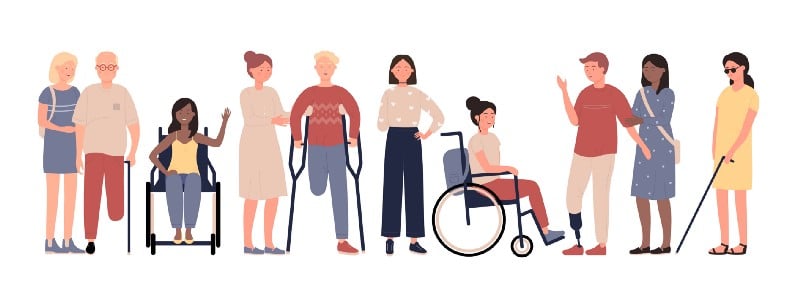Suggestions for neurodivergent adults as well as everyone else!

After graduating from high school, Many people struggle with adjusting to the realities of post-secondary education or the workplace. There are significant changes from what students are accustomed to that can be disorienting. Among them are sudden information overload and new high stimulation environments. Shifting to a post-secondary setting can be stressful for anyone, but this is especially true for those with some form of neurodivergence.
Thankfully, most schools and workplaces offer accommodations for those with divergent minds. While these might be available, certain stigmas and fears still exist when it comes to asking for those accommodations, creating yet another barrier to neurodivergent people having their needs met.
One critical skill for people with a neurodivergent condition to develop is self-advocacy. This is the ability to express and ask for your needs to be met. Learning how to self-advocate can help open communication between a neurodivergent person and their employer, teacher, doctor, or other caregivers. It can also help give a sense of confidence in knowing that you are capable of advocating for what you need.
So, how to self-advocate?
3 Tips for How to Successfully Self Advocate for Accommodations
#1. Do your research and understand your unique needs.
To ask for help accessing the specific accommodations you need, you must first know what helps you, as well as which barriers are present. Since neurodivergence encompasses a broad spectrum of unique and different abilities and conditions, the needs of each neurodivergent person will vary greatly.
Get to know your limitations, strengths, and capabilities. This will help you to know where you require accommodations. During this process, it’s essential to ask yourself questions and explore what truly works for you.
In some cases, employers, teachers, or supervisors may be well-versed on the topic of accommodations. In other situations, they may not be sure how to help. Arriving with your ideas not only helps you achieve your specific accommodation goals, but it also takes the guesswork out of the employer’s or teacher’s hands. When you know what you need, they can help you get the exact accommodations necessary for your success.
Take, for example, a neurodivergent person who struggles with emotional regulation. They may find that short, five-minute walks or breaks help them wait until an emotion passes before acting on it. Once they are aware that a walk or short break is what they need in moments of stress or reactivity, they can bring it up with their employer or professor and ask for that flexibility in their schedule.
#2. Plan how you are going to ask for accommodations.

For some neurodivergent folks, it can be a challenge to communicate specific needs related to accommodations. Not only do you need to discuss what can be perceived as weaknesses, but you may also have to reveal more than you are comfortable about your neurodivergent condition.
For some, planning out this important conversation is the best way to go. For others, however, anticipating this talk can be a nightmare. If planning works well for you, it may be helpful to script or plan a conversation with your supervisor before it happens. Determine which questions you are comfortable answering and which questions you’d rather not answer. You may also want to plan out certain explanations and ideas if it suits you.
Once you know the ins and outs of what you’d like to share, schedule a meeting.
During the meeting, it may be helpful to use these additional strategies, which will open the pathway to clear communication.
- Ask open-ended questions. This can help your employer or professor express their point of view. It will also help find a point of intersection between their expectations and yours when it comes to coordinating accommodations. An example of this would be asking, “What are some ways in which you’re willing to give accommodations?” This allows for open communication, as well as exploration of each other’s expectations.
- Be firm and assertive. This will help you communicate the necessary accommodations you need without being disrespectful. Use phrases such as “I need-” or “I would like-” rather than “I think I might-.” This will help affirm your needs. It can also show your employer or professor that you are self-aware and sure about what you need.
#3. Be ready with resources.
If you are unable or unwilling to speak about the specifics of your neurodivergence, arriving with communication aids, other people’s stories, or community resources relevant to your needs and situation may strengthen your communication and help you to make your point more easily. It may also lessen the pressure to reveal personal information you would rather keep private.
When you provide your employer or professor with real-world examples of the accommodations you need, you are providing evidence that they work. You may also want to include relevant information about how those accommodations were implemented and any information validating their effectiveness.
Once you feel confident that you’ve effectively communicated your needs, the responsibility falls on the employer or professor to accommodate you as needed and as legally required. Keep in mind that some people may refuse to go beyond their legal duty to do so. For this reason, it can be useful to know the laws surrounding accommodations in your country and region, to make sure you’re being helped as much as possible.
Self-advocacy in school and work
Not only can these skills help you access accommodations and assistance in school and the workplace, but they can also help you set critical social boundaries with coworkers, employers, and professors.
Skills like knowing and owning your unique needs, asking open-ended questions, and using assertive communication can be extra helpful when receiving unwanted or insensitive comments and questions about your neurodivergence. Overall, developing strong communication skills is a tool that will significantly help you navigate life as a divergent thinker in a post-secondary setting.
Self-advocacy is a crucial tool for both neurodivergent and neurotypical folks alike. For those with neurodivergence, however, self-advocacy can be a real game-changer for getting necessary accommodations. Not only can it help you communicate more efficiently with your employer or professor, but it can also help reduce the stigma surrounding aid for neurodivergent folks.
The more divergent thinkers are accommodated, the more accommodating the educational institutions or workplace becomes. This creates a space in which accommodation is accessible rather than taboo. Creating workplaces and study environments that are suitable for all, shifts us toward a future where all skills are valued and treasured.
References:
A. Kwok, (2008) Essential skills in Self-Advocacy. Published by BC Epilepsy Society Newsletter, Fall 2008. Retrieved Feb. 26, 2022 from http://www.bcepilepsy.com/files/Essential_Skills_in_Self_Advocacy.pdf
A.M.I. Lee. (N.D.) What is self-advocacy? Published by Understood. Retrieved Feb. 25, 2022 from https://www.understood.org/articles/en/the-importance-of-self-advocacy
Photo Credits
Flashvector /iStockphoto Standard License
ezoom / iStockphoto Standard License
CLICK HERE to visit the articles page.

Download Neurodiversity in the Workplace! – Free!
Bring Susan Fitzell, M.Ed., CSP
Top Neurodiversity Speaker
To YOUR Organization!
